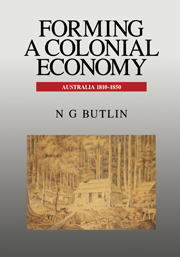Book contents
- Frontmatter
- Contents
- List of Tables
- List of Figures
- Acknowledgements
- Part I Forming an Economy
- Part II The Colonial Peopling of Australia: 1788–1850
- Part III Public Funding of Colonial Development: 1788–1850
- 5 Introduction
- 6 British Fiscal Characteristics
- 7 The Imperial Fisc in NSW and Van Diemen's Land to 1821
- 8 Broad Relations between British and Australian Fiscs to 1821
- 9 The Beginning of Local Budgeting: Real and Subterranean Budgets
- 10 The Conventional Legal Fisc in NSW: 1822–50
- Part IV The Colonial Australian Economy 1810–1840—A Historical, Statistical and Analytical Account
- Bibliography
- Appendixes
- Index
10 - The Conventional Legal Fisc in NSW: 1822–50
from Part III - Public Funding of Colonial Development: 1788–1850
Published online by Cambridge University Press: 04 August 2010
- Frontmatter
- Contents
- List of Tables
- List of Figures
- Acknowledgements
- Part I Forming an Economy
- Part II The Colonial Peopling of Australia: 1788–1850
- Part III Public Funding of Colonial Development: 1788–1850
- 5 Introduction
- 6 British Fiscal Characteristics
- 7 The Imperial Fisc in NSW and Van Diemen's Land to 1821
- 8 Broad Relations between British and Australian Fiscs to 1821
- 9 The Beginning of Local Budgeting: Real and Subterranean Budgets
- 10 The Conventional Legal Fisc in NSW: 1822–50
- Part IV The Colonial Australian Economy 1810–1840—A Historical, Statistical and Analytical Account
- Bibliography
- Appendixes
- Index
Summary
Administrative and Political Changes
The local New South Wales fisc was restored to provisional grace in 1819 when the British parliament legislated to provide retrospective legality to the imposts declared by prior governors. The legislation did not yet clarify the future legality of gubernatorial fiscal action. Bigge recommended, and had accepted, several important changes amongst which was the establishment of a Colonial Fund, under British Treasury scrutiny; and he supported the continuation of locally determined duties. The British government provided, in 1823, for a Legislative Council in NSW, partly to advise the governor on local revenue raising and expenditure. At the same time, it left the raising of duties a governor's prerogative. At least, the continuing authority to raise local revenues was clarified from 1823.
The 1823 Legislative Council did little more than formalise past practice and was a very small appointed body. Enlarged in 1825, its increased de facto representativeness gave it more influence to contest the governor's prerogatives. The basis of this influence was strengthened by clause 28 of the New South Wales Judicature Act (4 Geo. IV, cap. 96) whereby the local revenue raising powers were made ‘perpetual’ (1823). In 1828, legislation provided for local revenue raising to be determined, for the first time, by the Governor in Council. Considerable tensions between the governor and the council remained.
- Type
- Chapter
- Information
- Forming a Colonial EconomyAustralia 1810–1850, pp. 82 - 94Publisher: Cambridge University PressPrint publication year: 1994



